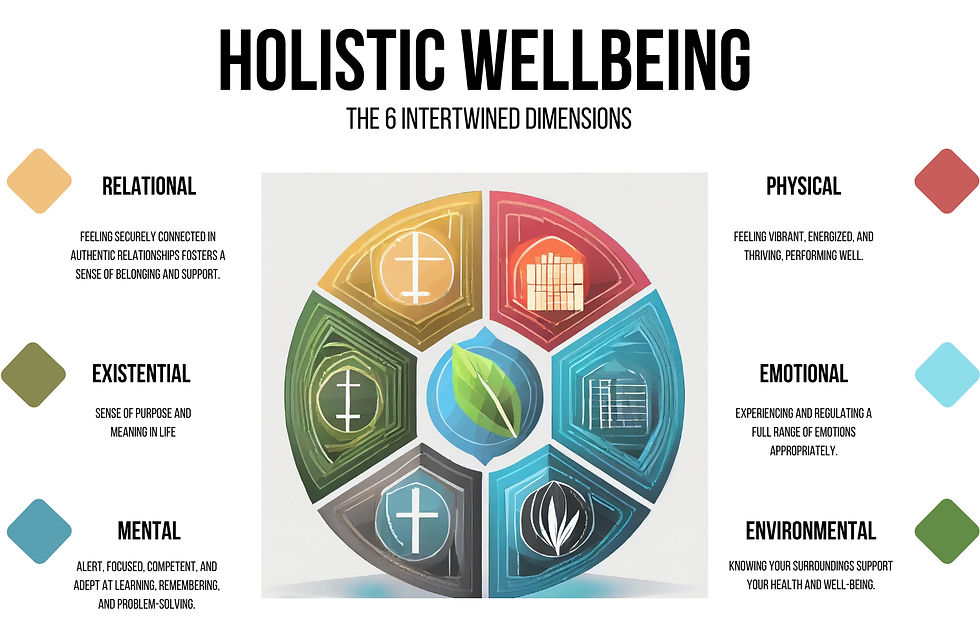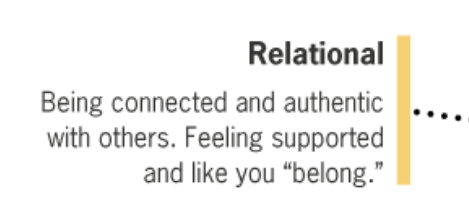Exploring the Impact of Relational Well-being on Holistic Health: Insights from a Health Coach
- Deepa Bhat
- May 16, 2024
- 3 min read
All aspects of health are intertwined and strongly connected. Deep Health doesn’t come from a pill or formula.
This is a continuation of the blog on Holistic Well-being. Holistic well-being entails in thriving in all aspects of human experiences., It's the whole person, whole life phenomenon.

In my coaching practice as a health and wellness coach, my clients voluntarily take the Health Score assessment. This assessment highlights the dimensions of their lives where they may be facing challenges. While physical wellness can be easily identified on a weighing scale, social connection or relational well-being is more deeply rooted. Addressing this aspect is crucial because without it, issues like emotional eating or sleep disorders and more cannot be effectively managed.
What is Relational health:
Valuing the importance of human connection while creating, engaging, and maintaining meaningful and authentic relationships with self, individuals, groups and our communities.
Relational well-being helps elevate the quality of our relationships. If you feel distant from someone important in your life or want to strengthen your relationships, focusing on relational well-being is essential.
Why is Relational Health Important in your journey of Holistic Wellbeing?
Our overall well-being includes multiple dimensions, and relational well-being is a crucial part of holistic health. Studies show that poor social health can lead to sickness or disease. Issues like isolation or loneliness, caused by a lack of a support network, can double the risk of death at any age. Conversely, good relational well-being improves all areas of life. Enhancing your social health helps you perform better under stress, boosts self-esteem, increases energy levels, and improves overall physical health.

These can arise with romantic partners, spouses, children, parents, friends, co-workers, siblings, and others. Our relationships can offer support during difficult times.

How to Achieve and Maintain Relational Well-Being
Everyday relational well-being involves simple, practical steps:
1. Reflect on Your Social Needs:
- Think about what aspects of your social life you enjoy. Do you love spending time with friends? Do you cherish family gatherings?
- Identify areas you want to improve. Do you wish you had more meaningful conversations? Would you like to reconnect with old friends?
2. Stay in Touch:
- Make an effort to keep in touch with supportive friends and family, even if it's just a brief call or text. For example, send a quick "thinking of you" message or schedule a weekly phone call.
3. Give Back:
- Be conscious of your investment in giving back, even in small ways. Help a neighbor with groceries or volunteer at a local charity.
4. Practice Active Listening:
- When interacting with friends, family, and colleagues, practice active listening. This means truly paying attention to what they're saying without interrupting. Nod, ask questions, and show you're engaged.
5. Join a Club or Organization:
- Join a local club or organization that interests you, such as a book club, sports team, or community group. This can help you meet new people and build new connections.
Even if some areas of your social life are out of your control, many are well within your control.
By making these small changes, you can enhance your connections with others and improve your overall well-being.
STRESS RECOVERY

Improving Relational Well-Being:
1. With Romantic Partners: Spend quality time together, communicate openly, and practice active listening to understand each other's needs and desires better.
2. With Children: Engage in activities they enjoy, show genuine interest in their lives, and provide a supportive environment where they feel safe to express themselves.
3. With Friends: Regularly check in on them, plan outings or virtual meetups, and be there to support them during tough times.
4. With Co-Workers: Foster a collaborative work environment, offer help when needed, and appreciate their efforts and contributions.
How does a coach become part of that journey:
In health and wellness coaching practice, I work with my trainees together to develop greater self-awareness and self-insight. They build a personal inventory of self-discovery tools for better relational well-being. This provides constant support, helping them achieve and maintain sustainable behavioral changes by leveraging their strengths and addressing their weaknesses.
For instance, a trainee may learn meditation techniques for relaxation, as meditation and breath regulation exercises can calm the mind and help one connect with their inner self.
Having satisfying relationships is essential for both mental and physical well-being. This helps to reinvent, relate, and reconnect. It offers opportunities for personal growth and development, emphasizing positive thinking to bridge gaps and find meaning and increased positive emotion and enhanced motivation.
In summary, by prioritizing relational well-being, you can enhance your relationships, improve your overall health, and lead a more fulfilling life.


Comments